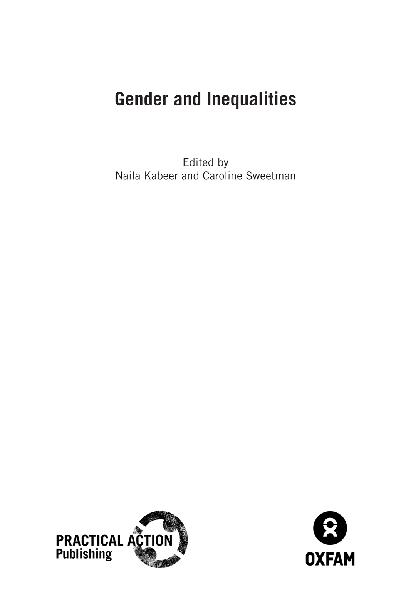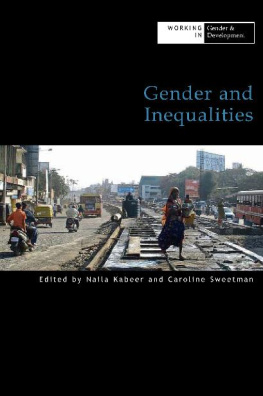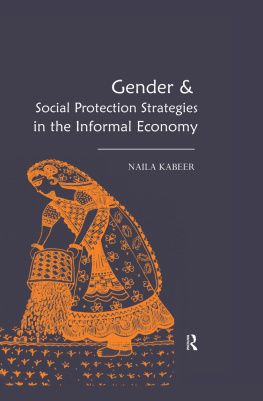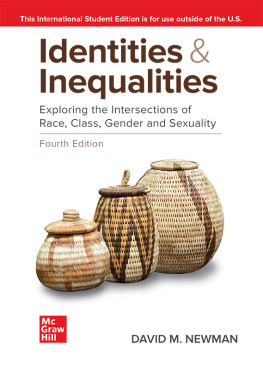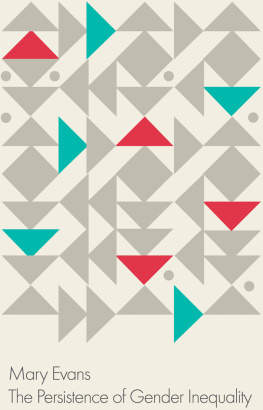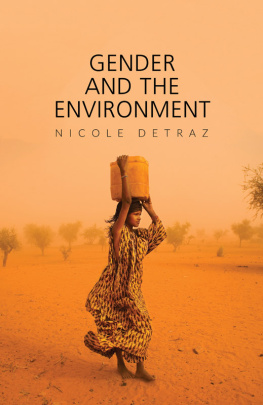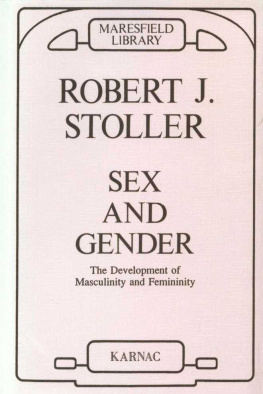Praise for this book
Gender and Inequalities is a timely and multi-faceted engagement with urgent issues of development. Its key message, economic growth, if pursued without strategies to curb widening inequalities in society, is fundamentally fragile and precarious needs to be heard urgently to challenge the mainstream reductive reasoning on development.
Professor Shirin M. Rai, Phd, FAcSS,
Department of Politics and International Studies, University of Warwick
Published by Practical Action Publishing in association with Oxfam GB
Practical Action Publishing Ltd
Rugby, Warwickshire, UK
www.practicalactionpublishing.org
Oxfam GB, 2018
The moral right of the editors to be identified as editors of the work and the contributors to be identified as contributors of this work have been asserted under sections 77 and 78 of the Copyright Designs and Patents Act 1988.
All rights reserved. No part of this publication may be reprinted or reproduced or utilized in any form or by any electronic, mechanical, or other means, now known or hereafter invented, including photocopying and recording, or in any information storage or retrieval system, without the written permission of the publishers.
Product or corporate names may be trademarks or registered trademarks, and are used only for identification and explanation without intent to infringe.
A catalogue record for this book is available from the British Library.
A catalogue record for this book has been requested from the Library of Congress.
ISBN 978-1-78853-013-2 Paperback
ISBN 978-1-78853-012-5 Hardback
ISBN 978-1-78044-728-5 Ebook
ISBN 978-1-78044-727-8 Library PDF
Citation: Kabeer, N. and Sweetman, C. (eds) (2018) Gender and Inequalities, Rugby, UK: Practical Action Publishing and Oxford: Oxfam GB.
Since 1974, Practical Action Publishing has published and disseminated books and information in support of international development work throughout the world.
Practical Action Publishing is a trading name of Practical Action Publishing Ltd (Company Reg. No. 1159018), the wholly owned publishing company of Practical Action. Practical Action Publishing trades only in support of its parent charity objectives and any profits are covenanted back to Practical Action (Charity Reg. No.247257, Group VAT Registration No. 880 9924 76).
Oxfam is a registered charity in England and Wales (no 202918) and Scotland (SC039042). Oxfam GB is a member of Oxfam International.
Oxfam GB,
Oxfam House, John Smith Drive,
Oxford, OX4 2JY, UK
www.oxfam.org.uk
The views and opinions in this publication are those of the author and do not represent those of Practical Action Publishing Ltd or its parent charity Practical Action. Reasonable efforts have been made to publish reliable data and information, but the authors and publisher cannot assume responsibility for the validity of all materials or for the consequences of their use.
Cover photo shows: a tribal woman watering the cement during road construction in Pune, India.
Credit: Nita Jatar Kulkarni
Printed in the United Kingdom
Contents
Naila Kabeer and Caroline Sweetman
Naila Kabeer
Diane Perrons
Sharon Bessell
Daria Ukhova
Jayshree P. Mangubhai and Chiara Capraro
Christine Hughes, Mara Bolis, Rebecca Fries and Stephanie Finigan
Andrea S. Papan and Barbara Clow
Galle Ferrant and Keiko Nowacka
Sheepa Hafiza, Mohammed Kamruzzaman and Hasne Ara Begum
Abigail Hunt, Hannah Bond and Ruth Ojiambo Ochieng
Liz Cooke
Naila Kabeer is co-editor of the international journal Gender & Development. She is Professor of Gender and Development at the Gender Institute, London School of Economics.
Caroline Sweetman is Editor of the international journal Gender & Development and works for Oxfam GB.
Working in Gender and Development
The Working in Gender and Development series brings together themed selections of the best articles from the journal Gender & Development and other Oxfam publications for development practitioners and policy makers, students, and academics. Titles in the series present the theory and practice of gender-oriented development in a way that records experience, describes good practice, and shares information about resources. Books in the series will contribute to and review current thinking on the gender dimensions of particular development and relief issues.
For further information on the journal please visit www.genderanddevelopment.org
Other titles in the series are available from www.developmentbookshop.com and include:
Gender-Based Violence
HIV and AIDS
Climate Change and Gender Justice
Gender and the Economic Crisis
Gender, Faith and Development
Gender, Monitoring, Evaluation and Learning
Gender, Business and Enterprise
Gender, Development and Care
Naila Kabeer and Caroline Sweetman
Patterns of poverty and inequality are changing, and challenging the ways we understand development. In recent years, many countries that tell a story of economic growth at national level have also been showing worsening vertical inequality (measured in terms of wealth or income). This increased polarisation between rich and poor in middle-income and high-income countries highlights the flaw in the (often implicit, but sometimes explicit) notion that economic growth heralds progress and development for humanity.
Gender and Inequalities presents a wide range of voices in international development research, policy and practice, and offers a gendered perspective on the question of inequalities. As Naila Kabeer states in her overview chapter, gender inequality is structured into the organisation of social relations in a society as fundamentally as class in capitalist societies, race in apartheid South Africa and caste in India. Womens location at the intersection between production and reproduction, between making a living and caring for the family, makes the organisation of gender relations central to the nexus between economic growth and human development, and hence central to the development agenda (Kabeer, this book p. 18).
Human societies, in other words, are organised along gendered lines, giving gender inequality a special economic, social and political primacy. Gender relations, roles and unequal power imbue the lives of all women and girls in all societies; they intensify the disadvantages inherent in being born in a country in the global South, being part of a marginalised ethnic group, the experience of disability. The very pervasiveness of gender inequality demands that policymakers should focus on it as a central concern.
The goal of human development should be sustainable economies which support all the worlds inhabitants, regardless of who they are or where they are located, to live decent, dignified lives characterised by fulfillment and wellbeing. The geographic distribution of poverty is altering, and our understanding of the drivers of poverty is becoming ever more sophisticated. With that comes new insight into the kinds of development policy and practice that might be effective in ensuring just and sustainable human development. Horizontal inequalities, including gender, race and caste, not only affect individual womens or mens chances of escaping or enduring poverty, but also shape the chances of households dependent on them.

